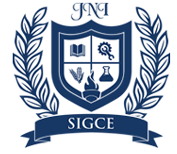First year Engineering is common to all branches which provide comprehensive and integrated studies of subjects in Engineering Mechanics, Applied Physics, App. Chemistry, Communication skill, Engg. Drawing, Applied Maths, Basic Electrical Engineering and Computer Programming. The main aim of these subjects is to develop the basic skills which are prerequisites to Engineering and Technology. This department has highly qualified and well experienced faculty members to make the students well versed with the engineering subjects. The faculty members conduct periodic tests, home assignments; tutorial, open book test etc. Continuous efforts are being taken by all the faculties to improve the performance of students.
Department Objectives
- To strengthen the fundamentals in Applied Sciences, Mathematics and Basic Engineering.
- To develop the ability to communicate effectively as technical professionals.
- To provide an environment for working effectively in groups.
- To create a good base for further engineering education.
Vision
To provide comprehensive requisite knowledge of applied sciences and basic engineering subjects to engineering students to strengthen their Mathematics, English basics and Soft skills
Mission
- To impart quality education in science, Mathematics, Mechanics, Drawing and Electrical engineering subjects
- To groom the students with flair towards hand on experience to solve real life problems.
- To acquaint the students with effective communication skills and provide them ample practice for improving their interpersonal skills.
- To inculcate discipline and moral values amongst the students.
B.Tech (MECHANICAL ENGG. INSTITUTION OF ENGINEERS INDIA)
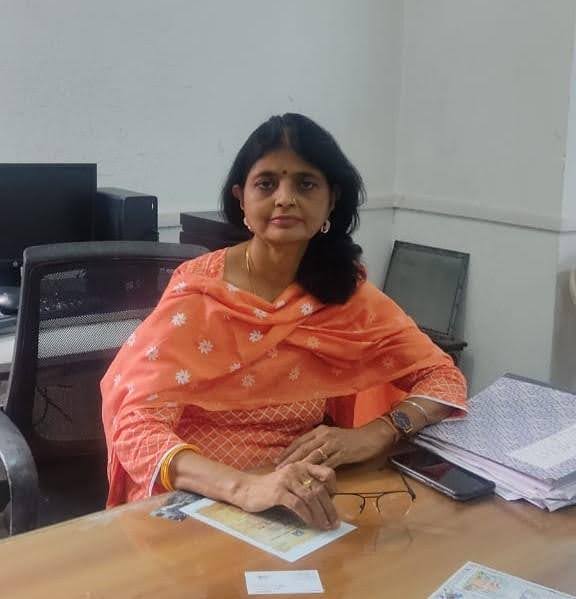
Dr. Sandhya D. Mathur
Head of the Department, Humanities and Science
Welcome to the Department of Humanities and Science, Smt.Indira Gandhi College of Engineering .
Our department is committed to providing a strong academic foundation and practical exposure to prepare students for successful careers in all Streams /disciplines. We emphasize innovation, research, and holistic development, nurturing students to become responsible professionals and lifelong learners.
We take pride in our dedicated faculty, well-equipped laboratories, and an environment that encourages curiosity and creativity. Our goal is to empower students to contribute meaningfully to society and excel in their chosen fields.
I invite you to explore our department, participate in our academic and co-curricular activities, and be a part of our vibrant learning community.
Warm regards,
Dr. Sandhya D. Mathur
Head of the Department
Humanities and Science, Smt.Indira Gandhi College of Engineering.
| Sr.No | Course Code | SEM I | Sr.No | Course code | SEM II |
|---|---|---|---|---|---|
| 1 | ASBS111 | Applied Mathematics-I | 1 | ASBS121 | Applied Mathematics-II |
| 2 | ASBS112 | Applied Physics | 2 | ASBS112 | Applied Physics |
| ASBS113 | Applied Chemistry | ASBS113 | Applied Chemistry | ||
| ASBS114 | Energy Science / | ASBS114 | Energy Science | ||
| ASBS115 | Material Science/ | ASBS115 | Material Science | ||
| ASBS116 | Biology for Engineers | ASBS116 | Biology for Engineers | ||
| 3 | ASES111 | Engineering Mechanics | 3 | ASES121 | Engineering Graphics |
| 4 | ASES112 | Basic Electrical & Electronics | 4 | ASES122 | Environmental science for Engineer |
| ASES113 | Digital System | 5 | CEPC121 | Data Structure | |
| 5 | ASAE111 | Professional Communication and Ethics | EEPC122 | Elements of Electrical Engineering |
|
| ASAE112 | Engineering Workshop | MEPC123 | Elements of Mechanical Engineering | ||
| 6 | ASVSC111 | C Programming | 6 | ASAE111 | Professional and Communication Ethics |
| 7 | ASVE111 | Universal Human Values | ASAE112 | Engineering Workshop | |
| ASHS111 | Indian knowledge System | 7 | ASVS122 | Python Programming |
|
| 8 | ASCC111x | Co Curricular Course-1 | 8 | ASVE111 | Universal Human Values |
| ASHS111 | Indian knowledge System |
||||
| 9 | ASCC112xx | Co Curricular Course-II |
| Sr.No. | Date of Event | Name of Event | Link |
|---|---|---|---|
| 1 | 26/09/2025 | Fresher’s | Click Here |
| 2 | 16/09/2025 | Orientation Day | Click Here |
| 3 | 27/2/2025 | Expert Lecture on UHV | Click Here |
| 4 | 7th November, 2024 | Word Association | Click Here |
| 5 | 28th October, 2024 | Movie | Click Here |
| 6 | 23rd October, 2024 | Yoga Session | Click Here |
| 7 | 14th October, 2024 | Role Play | Click Here |
| 8 | 10th October, 2024 | Freshers | Click Here |
| 9 | 9th October, 2024 | Garba | Click Here |
| 10 | 4th October, 2024 | Orientation Day | Click Here |
| 11 | 30th September, 2024 | Creative Storytelling | Click Here |
| 12 | 22nd November, 2023 | Technical Session | Click Here |
| 13 | 8th November, 2023 | Yoga Session | Click Here |
| 14 | 15th September, 2023 | Engineers Day | Click Here |
| 15 | 29th August, 2023 | Orientation Day | Click Here |
Seminar on ‘Introduction to CATIA SOLIDWORKS & PROE for FE Mechanical Students
PLACE: Mumbai
Conducted Seminar on Introduction to CATIA SOLIDWORKS & PROE , in association with Institute of Engineers (India) on 29 March 2019, for FE mechanical engineering students
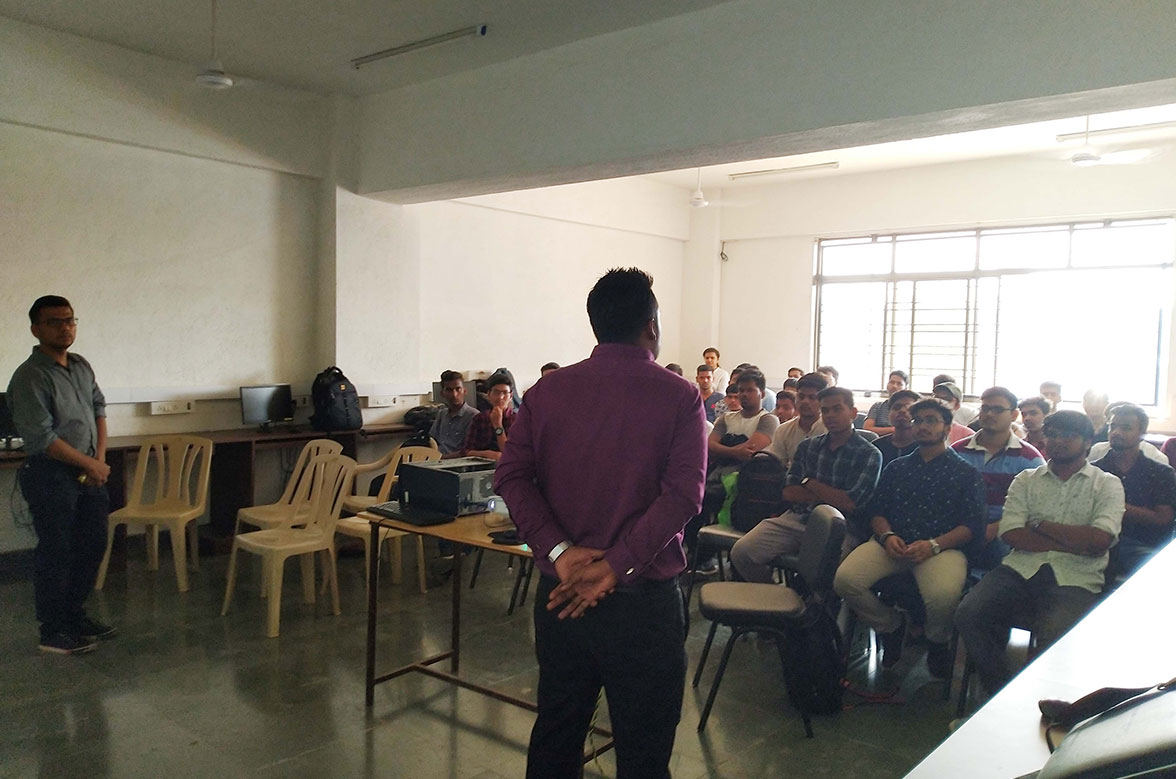

FE Visit to ACREX India 2019 Exhibition
PLACE: Mumbai
Acrex India 2019 is the South Asia’s Largest and Renown Exhibition on Refrigeration and Cold-chain, Air-Conditioning, Ventilation and Intelligent Buildings. This exhibition is organized by the ISHARE on 28th Feb to 2 March 2019 at Bombay Exhibition centre, Mumbai. FE mechanical students attended this exhibition on 1st March 2019 .This Exhibition gives student overall perspectives, working and updated information about Air-condition, and refrigeration. Different types of mechanical elements and equipments seen by the students. This exhibition will enhance students understanding about mechanical concepts and their practical applications .Students found this exhibition useful under the guidance of Dr. H.S.Dhanawade, Dr. A.S. Borkar and Prof. Rupali Jadhav.
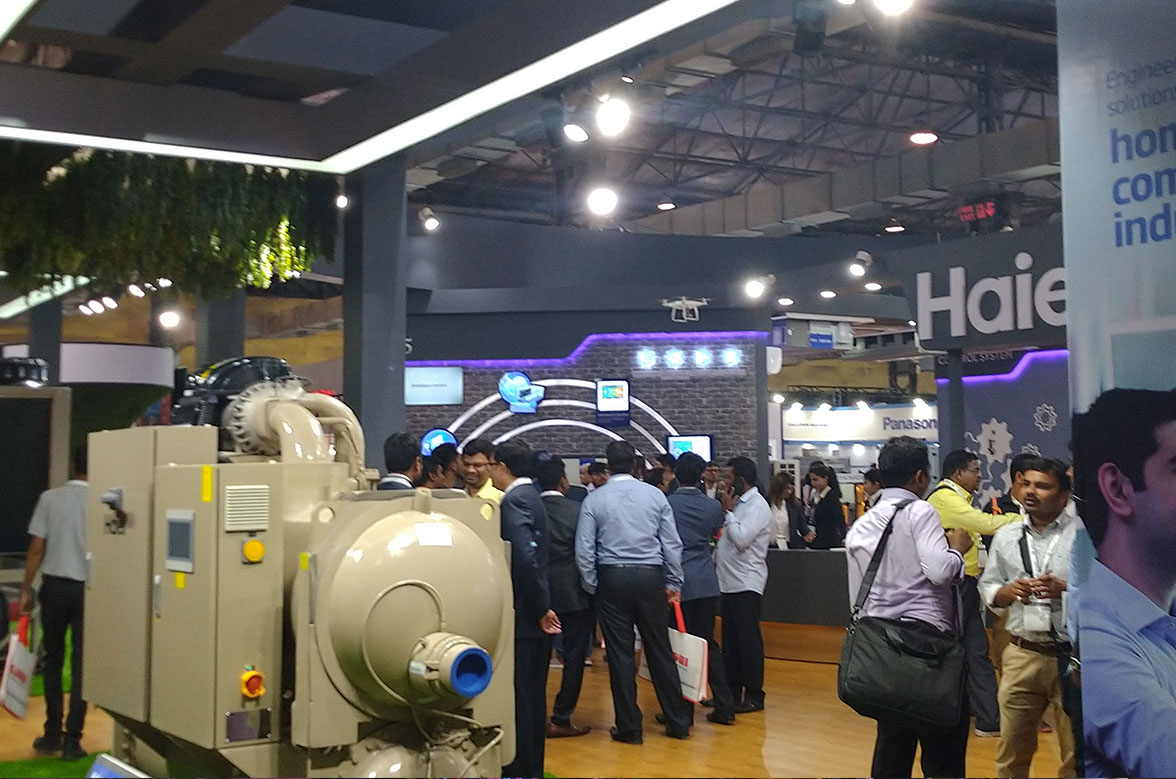
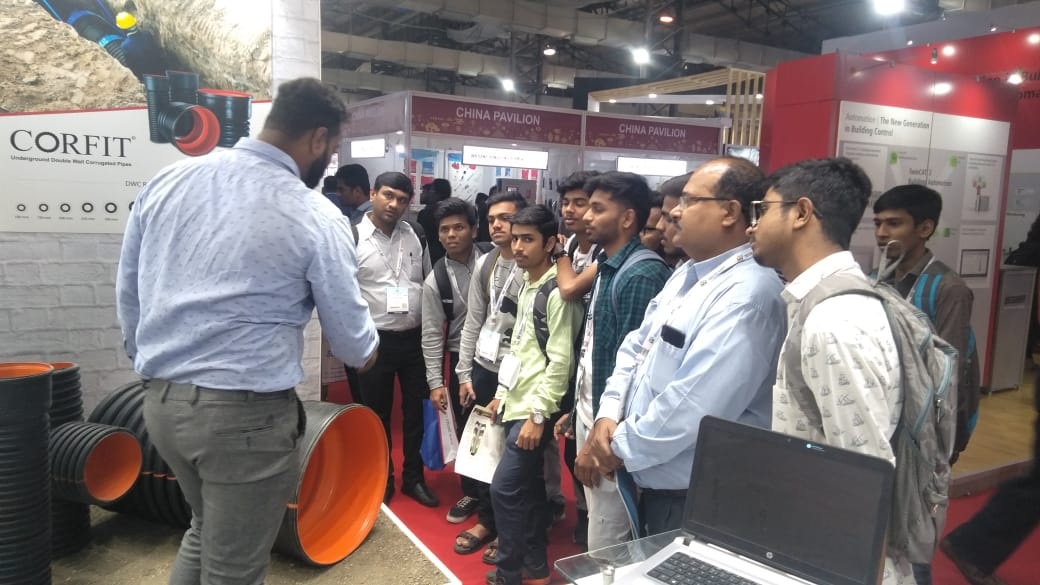
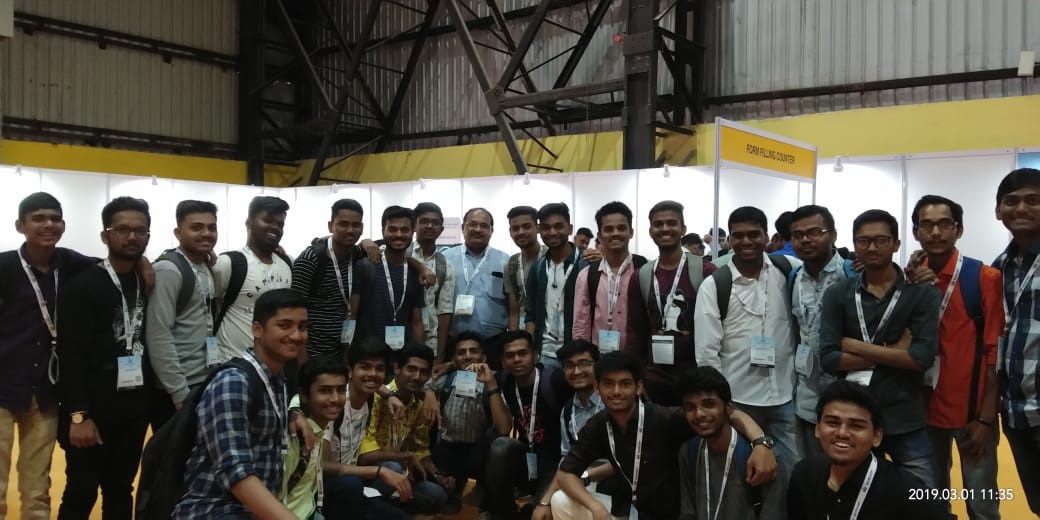
- Lab Name: Engineering Mechanics
Location of Laboratory:202
Lab in charge: Prof. Page A. V.
Details of Resources & Equipments:
Utilization of Laboratory: For F.E. All.
Engineering Mechanics is one of the important subjects which deals with mechanics of various structures and components. The results determined at laboratories ensure safety, strength, rigidity, reliability and behaviors of mechanical beams, trusses, joints and other technological aspects. It is thus significant to acquire sound theoretical knowledge coupled with practical inputs observed at laboratories. As per the requirement of the revised syllabus, lab is spacious and well equipped with different apparatus such as force table, beam reaction, bell crank leaver friction, flywheel, compound pendulum etc.

- Lab Name: AutoCAD Lab
Location of Laboratory: 615
Lab in charge: Prof.Videet Kamble
Details of Resources & Equipments:
Utilization of Laboratory: For F.E. All.
AutoCAD is the most widely used modeling package in today’s industrial development, for preparing drawings of all engineering components, designing mechanical engineering parts and modeling civil engineering structures. We explore students’ basic knowledge of engineering drawing with the help of computer. We conduct practical to perform two dimensional views, isometric views, lettering, dimensioning & sectional views etc
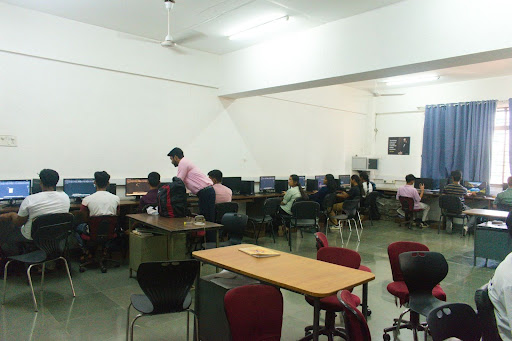
.
- Lab Name: Applied Chemistry
Location of Laboratory: 102
Lab in charge: Dr. Sandhya Mathur
Details of Resources & Equipments:
Utilization of Laboratory: For F.E. All.
With an era of change, Engineering chemistry focuses on giving hands on expertise with leading edge technologies & Global perspective on the effect of that technology. Engineering chemistry department has been well established to make the students proficient in subject. The subject is common for all first year bachelor’s degree students. Engineering chemistry laboratory is well equipped with latest apparatus consisting of Redwood viscometer, Pensky Marten’s and Able’s Flash Point apparatus which can be used for testing lubricating oil to determine viscosity, flash point and fire point. Flue gas analysis of fuels can be carried out by using orsat apparatus to determine the % of CO2, O2, CO in the combustion product. PH of the unknown samples can be determined using PH -1 Meter.
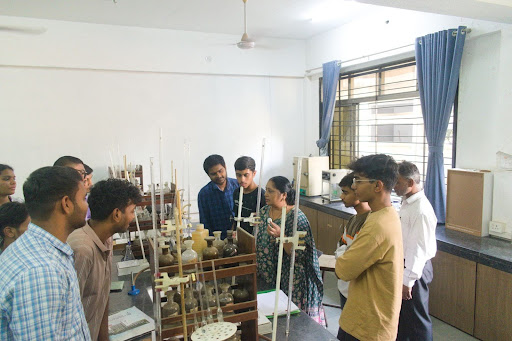
- Lab Name: Basic Electrical & Electronics Engineering
Location of Laboratory: 201
Lab in charge: Prof. D.D.GOTE.
Details of Resources & Equipments:
Utilization of Laboratory: For F.E. All.
BEEE Lab is well equipped with Kits for all the experiments in the syllabus. The lab is equipped with required measuring instruments like Ammeters, Voltmeters, multi meters & Watt meters. The Lab is also equipped with all required components like resistors, inductors, capacitors transformers motors & load banks. We have well experienced technical staff. Students perform following experiments under the guidance of faculty.
1. Mesh and Nodal analysis.
2. Verification of Superposition Theorem.
3. Verification Thevenins Theorem.
4. Study of R-L series and R-C series circuit.
5. R-L-C series resonance circuit
6. R-L-C parallel resonance circuit.
7. Relationship between phase and line currents and voltages in 3″ phase System (star & delta)
8. Power and phase measurement in three phase system by two wattmeter method.
9. O.C. and S.C. test on single phase transformer
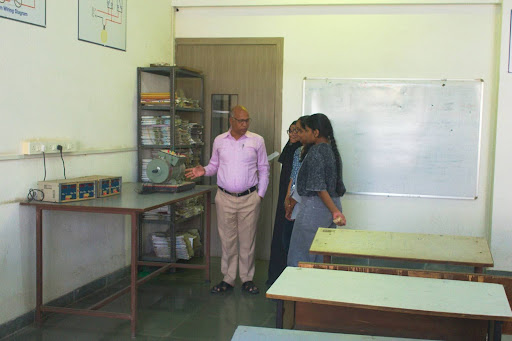
- Lab Name: Digital System
Location of Laboratory:404
Lab in charge: Prof. Kalyani fulzele
Details of Resources & Equipments:
Utilization of Laboratory: For F.E. All.
A digital system lab, often found within engineering, provides basic knowledge of digital system and equipped students with the foundational knowledge computer organization and architecture, fostering and understanding of how hardware and software components collaborate to execute tasks and preparing them to design and optimize computing system for real world applications. The key areas of focus in digital system lab are logic gates and combination circuits, digital components, memory system organization, I/O organization, Processor organization and control unit design.

- Lab Name: Professional and Communication Ethics (Language Lab)
Location of Laboratory: 106
Lab in charge: Dr.Preeti Kaushal
Details of Resources & Equipments:
Utilization of Laboratory: For F.E. All.
Language Lab is an equipped setting where language skills are polished. Language is always learned by the basic skills i.e. LSRW, for developing the speaking skills of students. They need to be exposed & given firsthand experience of listening to the ideal language user. Language lab. Provides this opportunity for the students.
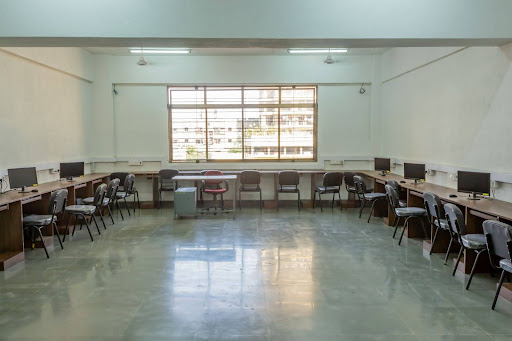
- Lab Name: Applied Physics
Location of Laboratory: 103
Lab in charge: Prof. D. S. Gangurde
Details of Resources & Equipments:
Utilization of Laboratory: For F.E. All.
The Engineering Physics Laboratory is well equipped with latest apparatus of fiber optics, high quality cathode ray oscilloscope, function generator, LASER beam, ultrasonic generator models of crystal cells, Newton ring’s apparatus and cathode ray tube to measure e/m ratio.
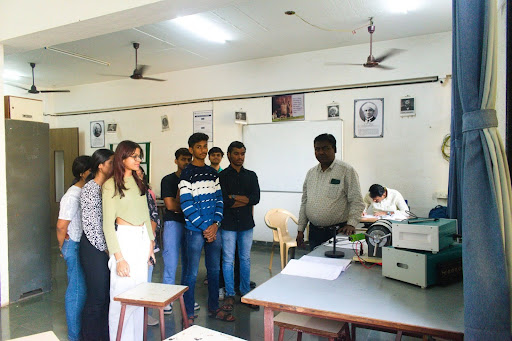
- Lab Name: C Programming
Location of Laboratory: 105
Lab in charge: Prof.Jayashri Mahale.
Details of Resources & Equipments
Utilization of Laboratory: For F.E. All.
As per the requirement of today’s industrial development, we explore students’ basic knowledge of Programming with the help of C language. C is a high-level structured oriented programming language. It is mainly developed as a system programming language for operating systems. We conduct practical projects on the construction of Algorithm and flowchart, Fundamentals of C-Programming like Functions, Arrays, String, Structure, Union, and Pointer etc. For implementation of above concepts with the help of Dev C++ IDE software on windows.
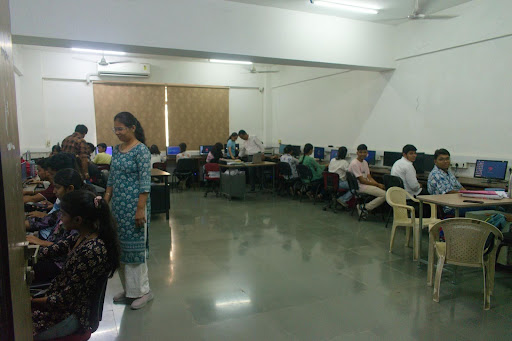
- Lab Name: Python Programming
Location of Laboratory: 216
Lab in charge: Prof. Mohini Nerkar
Details of Resources & Equipments:
Utilization of Laboratory: For F.E. All.
In the last few years, python has been the choice of many computer students and programmers. Its importance as a language for learning and creating program is ever growing. Most of the software companies are expecting students to have knowledge in python. We conduct practical on fundamental of python programming, object-oriented programming concepts with libraries. For Implementation of above concepts, we use IDLE python software on windows or open-source operating system.
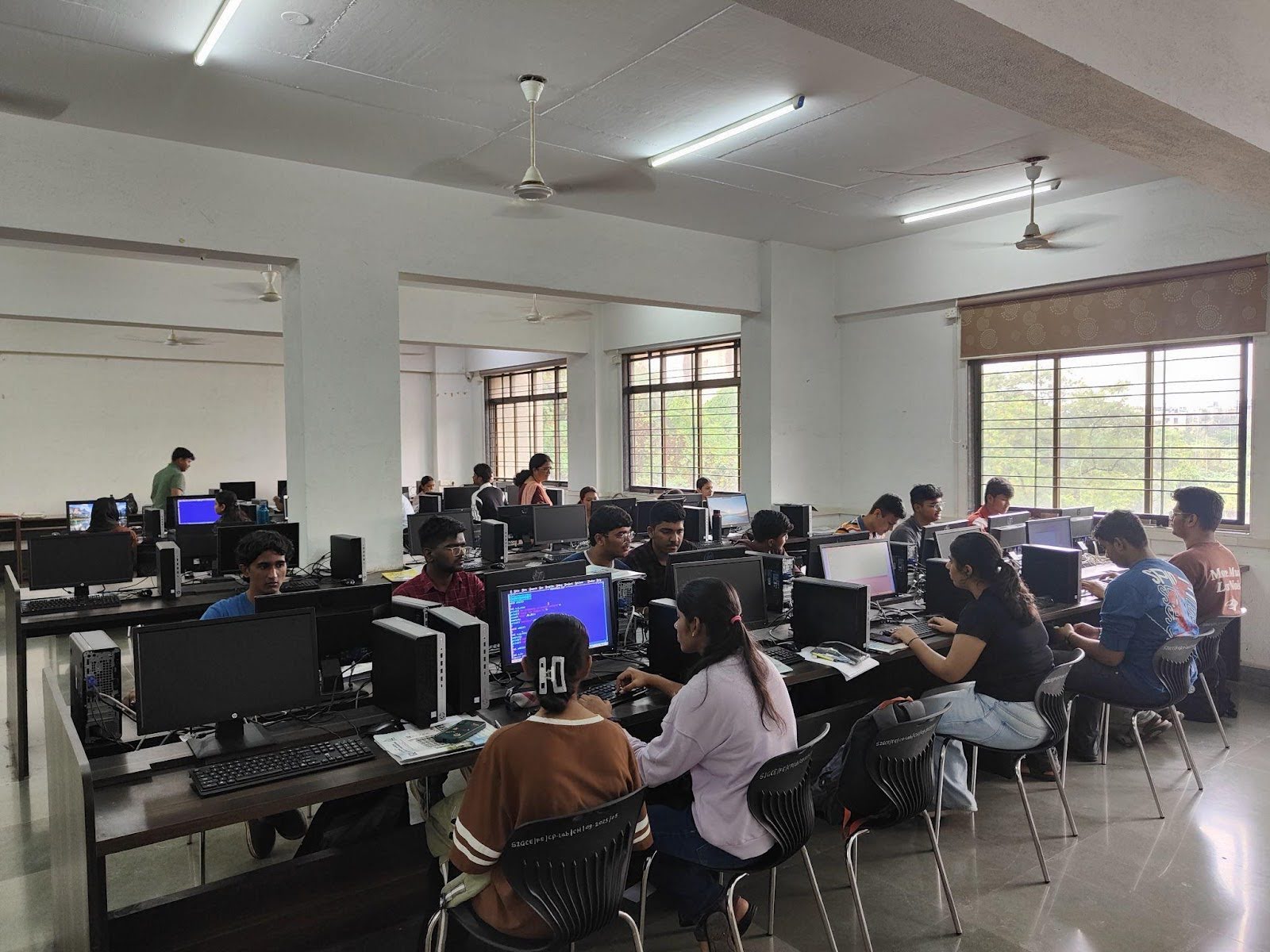
- Lab Name: Engineering Workshop(Mechanical)
Location of Laboratory: 614
Lab in charge: Prof.Aditya Kakkad
Utilization of Laboratory: For F.E. All.
Objective:
To familiarize with the basic manufacturing processes and to study the various tools and equipment used, hands-on training is given in different sections. Essentially students should know the labour involved, machinery or equipment necessary, time required to fabricate and also should be able to estimate the cost of the product or job work.
DETAILS OF RESOURCES & EQUIPMENTS:
The subject workshop technology has become increasingly important to the engineers engaged in the production of various types of machines and tools. The ability to work skillfully with hands, can be developed more readily and accurately, when the work to be performed in the shop floor it is necessary for students to understand both in practical and theoretical aspects. Spacious, fully ventilated workshop includes the Fitting section, Smithy section, Carpentry section, welding section, Machine shop, Sheet metal working and Electric wiring etc.
Fitting
The term fitting, is related to assembly of parts, after bringing the dimension or shape to the required size or form, in order to secure the necessary fit. The bench work and fitting plays an important role in engineering. Although in today’s industries most of the work is done by automatic machines which produces the jobs with good accuracy but still it (job) requires some hand operations called fitting operations.
Carpentry
Carpentry is the process of shaping Timber, using hand tools. The products produced are used in building construction, such as doors and windows, furniture manufacturing, patterns for moulding in foundries, etc. Carpentry work mainly involves the joining together of wooden pieces and finishing the surfaces after shaping them
Blacksmithy
Blacksmithy or Forging is an oldest shaping process used for producing small articles for which accuracy in size is not so important. The parts are shaped by heating them in an open fire or hearth by the blacksmith and shaping them through applying compressive forces using a hammer.
Welding
Welding is a process for joining two similar or dissimilar metals by fusion. It joins different metals/alloys, with or without the application of pressure and with or without the use of filler metal. The fusion of metal takes place by means of heat. The heat may be generated either from combustion of gases, electric arc, electric resistance or by chemical reaction.
The welding is widely used as a fabrication and repairing process in industries. Some of the typical applications of welding include the fabrication of ships, pressure vessels, automobile bodies, off-shore platforms, bridges, welded pipes, sealing of nuclear fuel and explosives, etc.
Sheet metal work
Sheet metal work has its own significance in the engineering work. Many products, which fulfill the household needs, decoration work and various engineering articles, are produced from sheet metals. Common examples of sheet metal work are hoopers, canisters, guards, covers, pipes, hoods, funnels, bends, boxes etc. Such articles are found less expensive, lighter in weight and in some cases sheet metal products replace the use of castings or forgings.
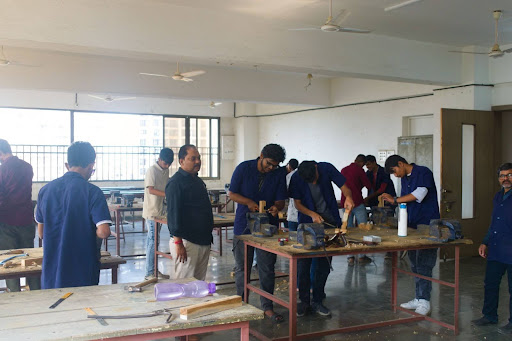
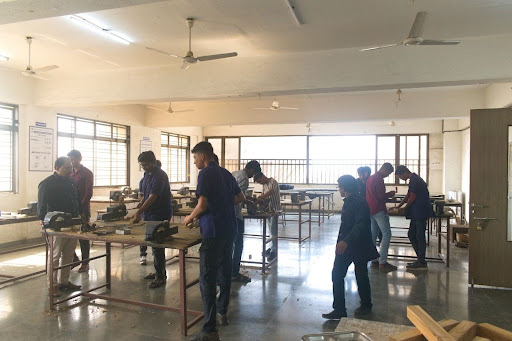
- Lab Name: Engineering Workshop(Computer)
Location of Laboratory: 105
Lab in charge: Prof. Jayashri Mahale
Details of Resources & Equipments:
Utilization of Laboratory: For F.E. All.
The Computer Workshop Lab is a practical learning space where students gain hands-on experience with computer hardware and software. It helps them understand the basic components of a computer, system assembly, installation of operating systems, and troubleshooting techniques. The lab also supports learning programming, networking, and maintenance skills essential for real-world applications.
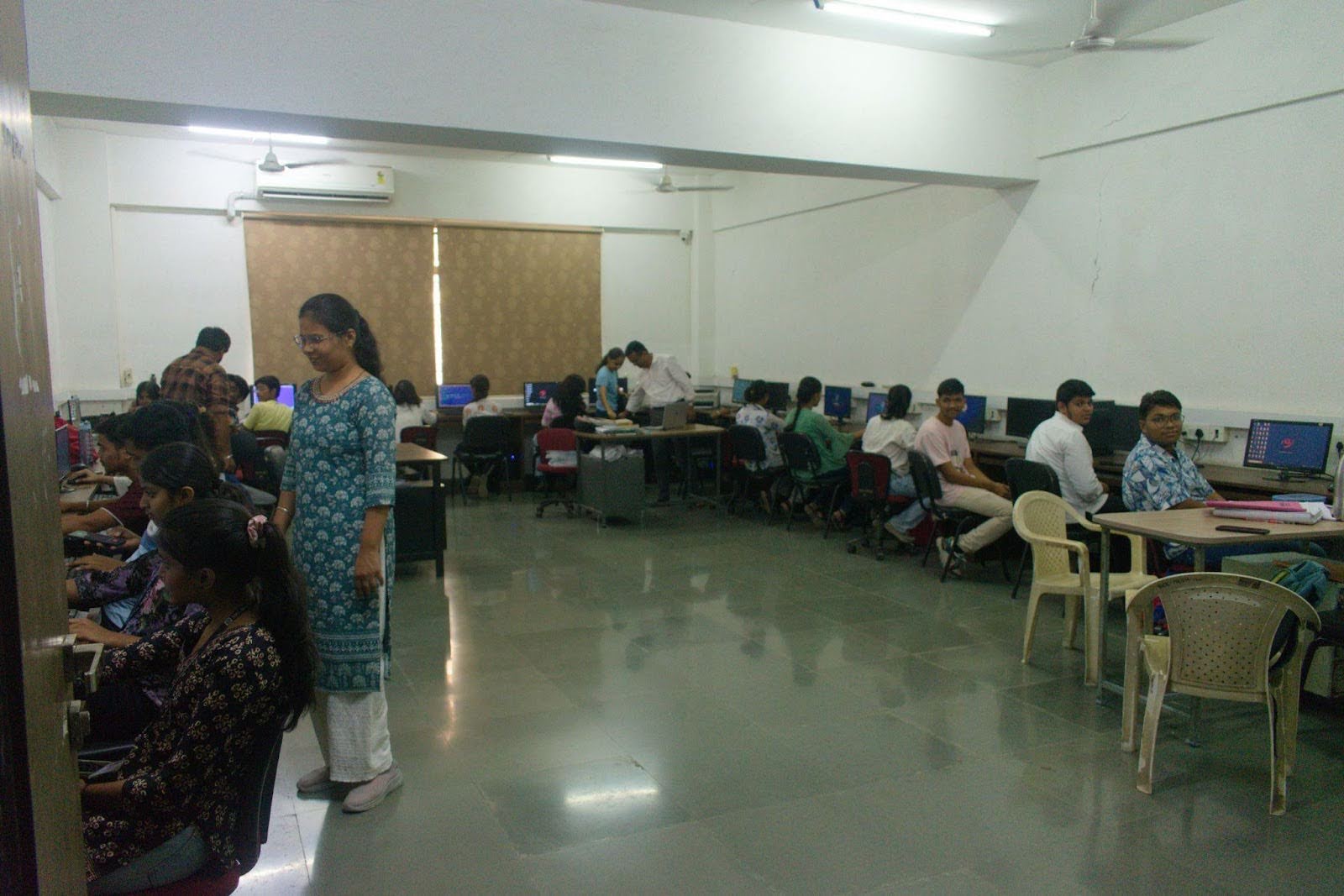
| Date | Notice Descritpion | Link |
|---|---|---|
| 12/09/2025 | Subject Choice SIGCERO | Click Here |
| 03/10/2025 | Unit Test Exam | Click Here |
| 12/03/2025 | Parent Teacher Meeting | Click Here |
| 27/12/2024 | Notice regarding commencement of II Sem | Click Here |
| 07/03/2025 | Seminar on occassion of womens day | Click Here |
